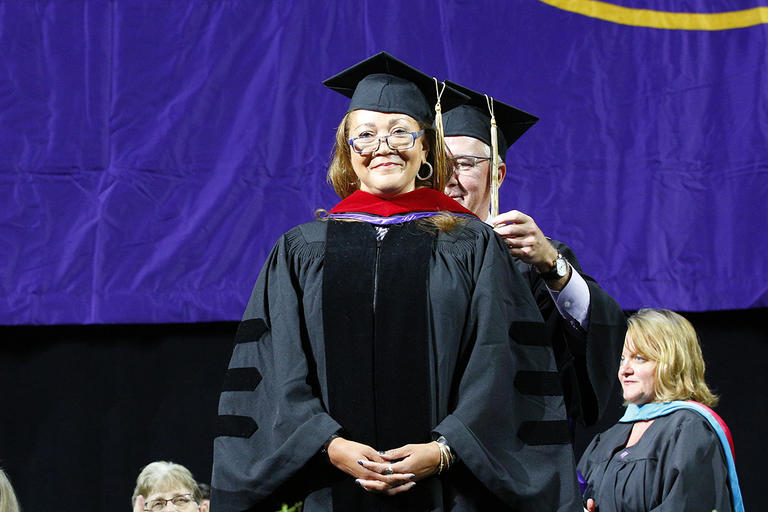Friday, May 25, 2018
Michele Norris
Doctor of Journalism
Award-winning journalist. Forceful voice for honest expression in the nation’s conversation on race. True believer in the power of quiet activism. Gifted and insightful author.
Michele Norris, you are an extraordinary communicator who embraces journalism at its core, that is, telling stories with a purpose – stories that will engage the reader, listener or viewer with a call to action. You have focused on issues that need attention: poverty, children at risk and the nation’s drug problems. You initiate and animate vital conversations at the intersection of race, identity, difference and understanding.
You kick-started your career in print with a journalism degree from University of Minnesota in your hometown of Minneapolis. In the early 1990s, you wrote for the Washington Post, the Chicago Tribune and the Los Angeles Times. You joined ABC News in Washington for a decade. In 2002, you became news yourself when you were named the first African American woman to host a National Public Radio program, joining public radio’s longest running national program “All Things Considered.” Your captivating voice, lively intellect and mastery of the art of the interview were evident in the substantive and confident exchanges you conducted with world leaders, Nobel Laureates, and experts of all stripes.
You became an acclaimed author with the publication of your first book, The Grace of Silence: A Family Memoir. Your original intention was to tell stories in the words of several families, until your personal research made you realize how little you knew about your own. You crafted the secrets you uncovered into a personal reflection on your extended family’s complex racial legacy and experience of living in “Jim Crow America.”
In 2012, you stepped down from your NPR hosting duties and political coverage when your husband, Broderick Johnson ‘78, an attorney and a loyal son of Holy Cross, joined President Obama’s re-election campaign. The change in your career plans provided a gift of time to focus on developing what would become The Race Card Project, in which you challenged listeners to document their observations and experiences about race and identity in a six-word sentence. You have received more than 200,000 submissions from 50 states and 90 nations, creating an invaluable archive of people’s true feelings and lived experiences and spurring a worldwide conversation.
Your audience spans generations. With a focus on your youngest listeners, you developed The Backseat Book Club, an interactive series on NPR that engages young people in literature. Your vision and creativity in instilling a love of reading in children was honored with the 2013 Impact Award by Every Child a Reader and the Children’s Book Council.
You left NPR in 2015 for the Aspen Institute’s The Bridge, now home of The Race Card Project. As executive director, you have leveraged your national visibility, masterful interviewing skills and natural ability to connect with others to bring new voices into the nation’s conversation on race. Your article in the recent National Geographic special issue on race confirms your presence as essential to the nation’s complex and crucial dialogue. Your trusted voice and dedication to exploring all perspectives is an inspiration to our graduates and a challenge to engage in conversations, intentional and honest, about race, identity and difference.
Your work has been widely recognized. In addition to a Peabody Award in 2013 for The Race Card Project, you earned both an Emmy and a Peabody Award for your role in ABC News’ coverage of the 9/11 terrorist attacks. You were named 2009 Journalist of the Year by the National Association of Black Journalists. In 2017, you received the inaugural Gwen Ifill Award from the International Women’s Media Foundation. The award carries forward the inspiring legacy of your great friend, the late Gwen Ifill, who, like you, was a wise mentor and generous supporter of women in journalism.
That all may know of our great esteem for you and our strong support for your tireless efforts on behalf of understanding, connectivity and inclusion through honest dialogue about race and identity, the College of the Holy Cross confers upon you this day the degree, Doctor of Journalism , honoris causa.


